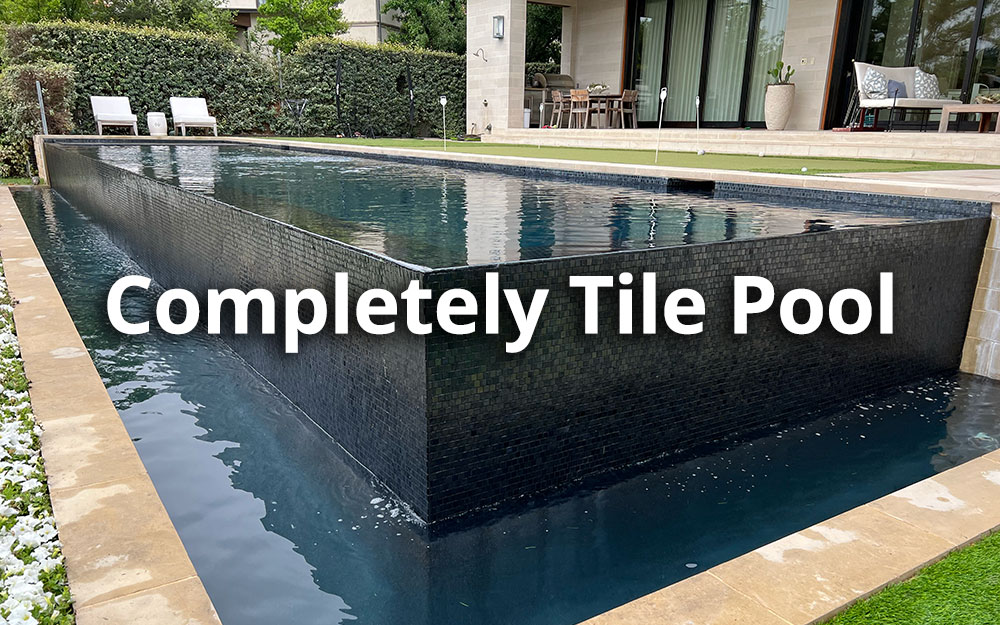When a swimming pool is present, it becomes the centerpiece of any outdoor living space. It can transform an otherwise dull and uninteresting space into a place where family and friends can come together to enjoy the outdoors and have fun.
Swimming pools come in different shapes and designs. Some are made of concrete, while others are made of more natural materials such as stone.
Tile pools, in particular, are becoming increasingly popular due to their aesthetic appeal and practical benefits.
Completely tiled swimming pools have a luxurious, high-end look that concrete pools cannot match.
They are also easier to clean and maintain than other types of pools.
Can You Tile Your Entire Pool?
This is a common question with many different answers. Some pool builders say that tiling and entire pool is a good idea. Others say no, tiling your entire pool is a bad idea.
So, what’s the verdict? Can you tile your entire pool? The answer is yes. But there are some caveats depending on a few factors, such as:
- Pool size
- The shape of your pool
- Type of tile
- Budget
Size of Your Pool
Tiling an entire pool can be a big project, and it’s essential to ensure that you have enough tile to cover the whole surface.
However, tile can get pricey.
While a large tiled pool is beautiful, it will be an investment. And keep in mind that you’ll need to purchase extra tiles to have on hand for future repairs.
Size is not only a contributing factor when considering the cost of tiles, but also future repairs. The more tile you have, the more surface area there is that is subject to issues like cracks and erosion.
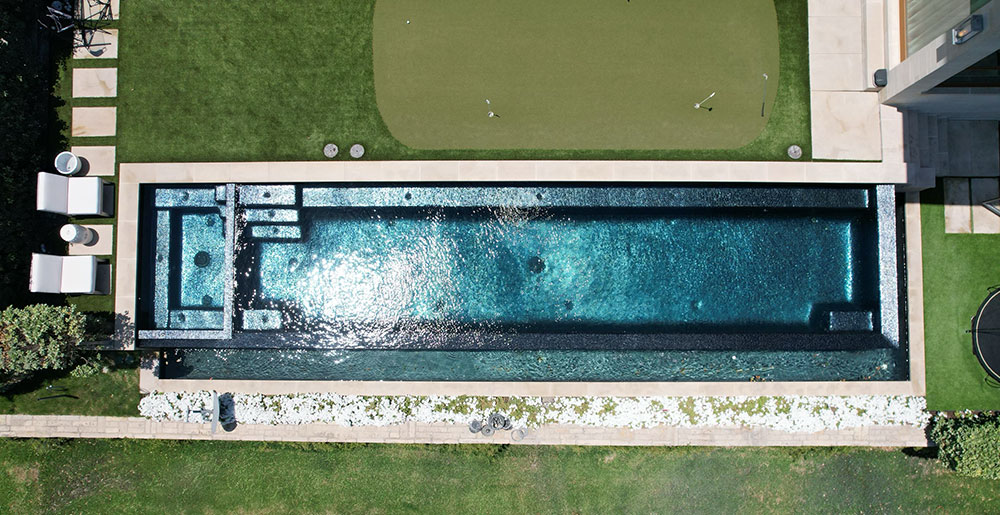
The Shape of Your Pool
The shape of your pool is just as important as the tile you choose when creating your perfect oasis. For example, a rectangular pool is more accessible while tiling, while an organic shape is more complicated and challenging.
When tiling a rectangular pool, one can use any size of tiles, while in an organic shape, you are only limited to small tile due to the shape of the pool.
Types of Pool Tile
There are many different types of pool tile to choose from. Each has advantages and disadvantages. The most common choices are:
- Glass: Easy to clean, but more expensive.
- Stone: Provide a natural or classic look, but are harder to clean.
- Porcelain: Most cost-effective, durable, and easy to clean.
Budget for Pool Tile
Tiling an entire pool will cost much more than just tiling the walls or floor. If you’re on a budget, you may consider tiling some portions or using cheaper tile options.
No matter your budget, there are many options available to you. You can find tile that fits both your style and your budget.
How Much Does It Cost to Tile an Entire Pool?
Unfortunately, there isn’t a definite answer as the cost of tiling an entire pool will vary depending on the size and the type of tile you intend to use.
The average cost for tiling an entire pool is $15,000. A tiled pool at this price point would most likely be a standard rectangle shape of small size and use of porcelain tile.
Larger pools with unique shapes or premium tiles can cost closer to $75,000+. Even more, a top-of-the-line luxurious pool can cost around $150,000.
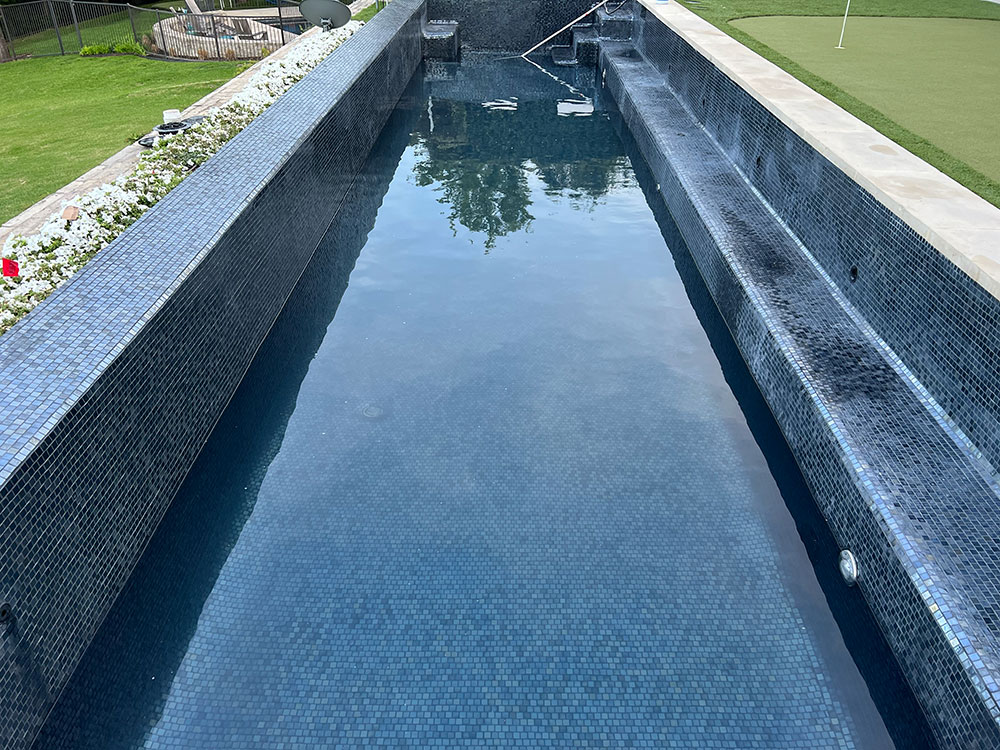
How Much Does New Pool Tile Cost?
The cost of pool tile varies depending on the style and type.
Porcelain Pool Tile
Among the tile options available, porcelain is one of the most popular choices for pool applications. It is strong, durable, and easy to clean.
The cost of porcelain tile ranges from $1.6 to $50 per square foot, making it one of the more affordable tile options.
Glass Mosaic Pool Tile
Glass pool tile is a popular choice for pools because it is easy to clean and maintain. It is also available in many colors, making it a versatile option. Above all, glass tiles give a pool a luxurious, resort-style look.
The cost ranges from $7 to $50 and more per square foot.
Stone Pool Tile
Stone pool tile is common in pools that seek to provide an organic or ancient flare. The cost of stone pool tile ranges from $5 to $30 per square foot.
Benefits of Fully Tiling a Pool
Tiling your pool might seem like a large task and a potential expensive project, but the endeavor is advantageous and beneficial.
Here are some of the benefits of completely tiling a pool.
Easy To Clean
A tiled pool is much easier to clean than a concrete pool. Whereas concrete is porous and will trap scum, tile is often flush and treated with a long-lasting glaze. Making it easier to scrub off dirt and grime.
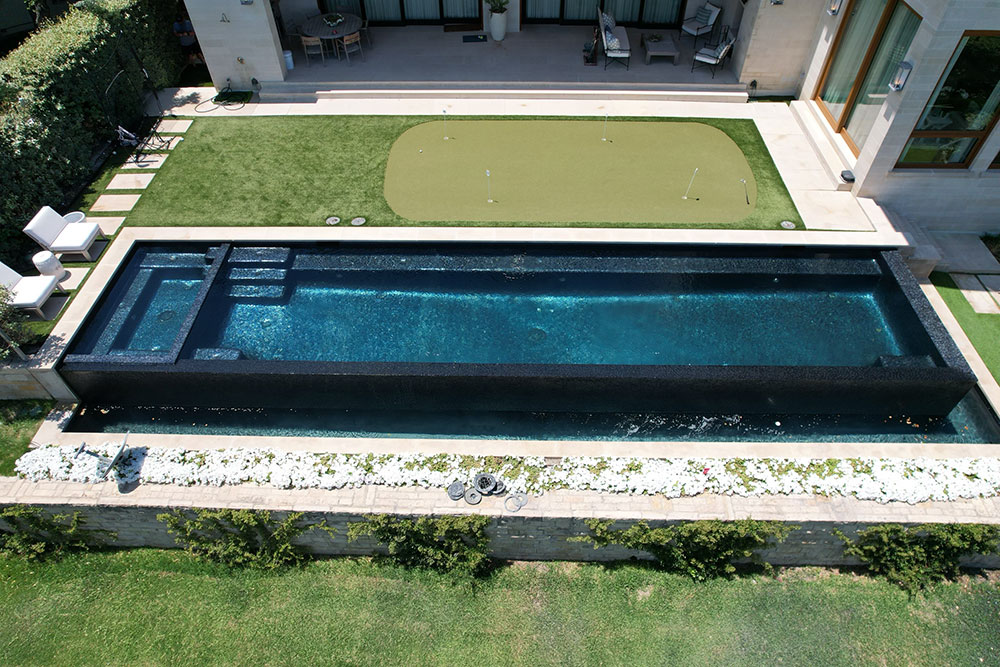
Aesthetic Appeal
Tile comes in a wide range of colors, sizes, and shapes. This allows you to create a truly unique and aesthetically pleasing pool.
Improved Durability
Tile is a very durable material that can last for many years with proper care and maintenance. This makes it a wise investment for your home when compared to plaster.
Increases Property Value
A beautiful pool is a great selling point for any home. If you ever decide to sell your home, tiling your pool will increase its value.
Many buyers will prefer a tiled pool over a concrete pool due to its low maintenance costs.
What Is Waterline Tile?
A waterline tile is a type of tile that is installed along the waterline of a pool. It is usually made of ceramic or porcelain and can come in various colors and styles.
Waterline tile serves two primary purposes. It helps protect the pool structure from water damage and provides a decorative element that can enhance the pool’s appearance.
In many cases, waterline tile is installed using a special adhesive that is designed to withstand the chemicals in pool water. This ensures that the tile will stay in place even when the water level fluctuates.
Installing waterline tile is a relatively simple process, but it is essential to hire a professional if you want the job done correctly.
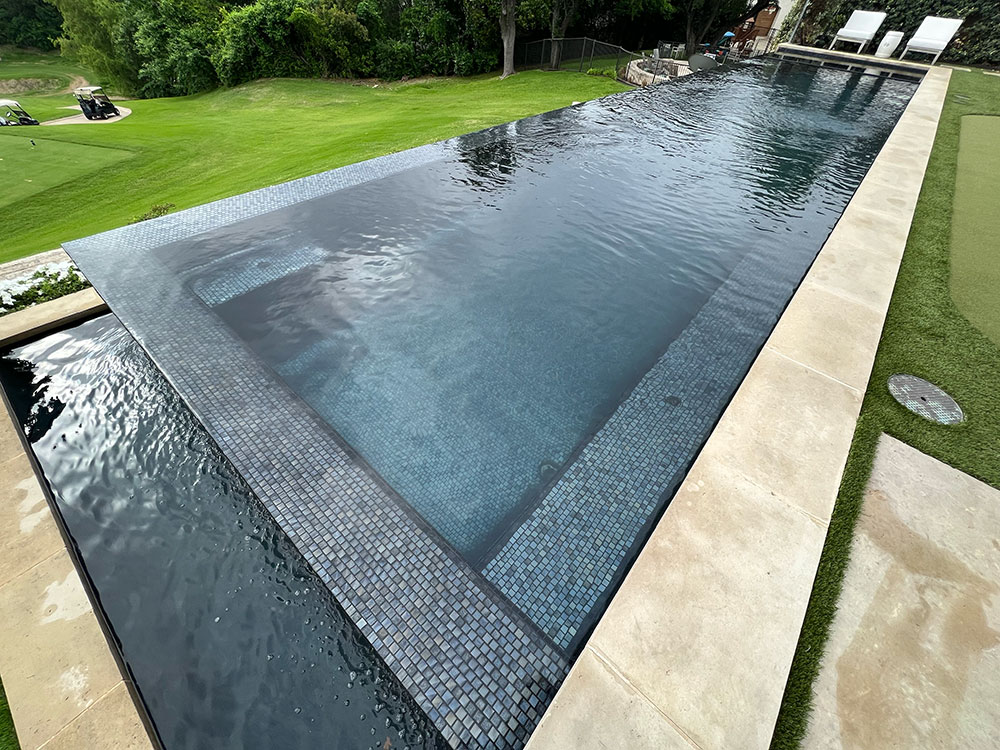
Can I Tile My Concrete Pool?
After experiencing a tiled pool, many wonder if it’s possible to remodel a concrete pool by adding tile.
The answer is yes!
Tiling your concrete pool is a great way to give it a new look and protect it from future damage.
However, there are a few things to remember when tiling your concrete pool.
First, you’ll need to ensure that your pool’s surface is smooth and even.
If there are any cracks or uneven surfaces, they will need to be repaired before you start tiling.
Second, you’ll need to choose the type of tile for your pool. There are many different types of pool tile available, so it’s important to choose one that is durable and easy to clean.
Finally, you’ll need to ensure that the tiles are properly sealed and grouted, so they don’t come loose over time.
How Long Does Pool Tile Last?
Most pool tiles are made from ceramic or porcelain, both very durable materials. With proper care, pool tile can last for decades.
The first step in preventing damage to your tile pool is to ensure that the tile is properly installed. Next, the tile should be set in a mortar bed and grouted to avoid movement and cracking.
It’s also important to use the right cleaning products on pool tiles. Harsh chemicals can damage the finish and lead to premature deterioration.
In addition, regular pool maintenance will help extend the pool tile’s life. This includes maintaining proper water chemistry, removing debris and calcium build-up, and regularly checking for cracks or chips.
Following these simple tips, you can enjoy your pool surface for over 25 years which most tile manufacturers guarantee.
Is Full Pool Tiling Worth It?
Making the final decision on whether to go full pool tiling or not is any remodeler’s question.
So, is full pool tiling worth it?
While full pool tiling has its benefits, it’s important to weigh all of your options before making a decision. First and foremost, tiling can provide protection that other pool finishes can’t match.
In addition, tile is extremely durable and resists fading and wear, meaning your pool will look good for years to come.
In addition, tile is also easy to clean and maintain. With other finishes, you might have to worry about algae or other build-ups, but tile repels water and dirt, making it a low-maintenance option. However, tile can also be one of the more expensive pool finishes on the market. So, if you’re on a tight budget, you might want to consider another option.
Ultimately, whether or not to tile your pool is up to you. Just be sure to weigh your options before making a final decision.
But considering the benefits that outweigh the disadvantages, which are majorly on the cost side, it is worth it to have a tile pool, especially considering the long-term maintenance costs.
Questions?
To learn more about the specific requirements to tiling your pool contact Willsha Pools. We will give you a free quote with the age, size, and shape of your pool in mind, as well as your design goals.

